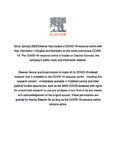Experience of Using Simulation Technology and Analytics During the Ebola Crisis to Empower Frontline Health Workers and Improve the Integrity of Public Health Systems
| dc.contributor.author | Mellor, N | |
| dc.contributor.author | Horton, H | |
| dc.contributor.author | Luke, D | |
| dc.contributor.author | Meadows, J | |
| dc.contributor.author | Chatterjee, Arunangsu | |
| dc.contributor.author | Gale, Thomas | |
| dc.date.accessioned | 2020-08-25T13:27:29Z | |
| dc.date.available | 2020-08-25T13:27:29Z | |
| dc.date.issued | 2016 | |
| dc.identifier.issn | 1877-7058 | |
| dc.identifier.issn | 1877-7058 | |
| dc.identifier.uri | http://hdl.handle.net/10026.1/16190 | |
| dc.description | Humanitarian Technology: Science, Systems and Global Impact 2016, HumTech2016 keywords: Analytics keywords: Analytics keywords: Analytics keywords: Analytics keywords: Analytics keywords: Analytics keywords: Analytics keywords: Analytics keywords: Analytics keywords: Analytics | |
| dc.description.abstract |
The Ebola outbreak highlighted the challenge of health security and particularly of how best to give frontline workers the knowledge, confidence and competence to respond effectively. The goal was to develop a tool to improve infection prevention and control through local capacity building within the context of an emergency response. The research showed that digital technology could be a powerful 'force multiplier' allowing much greater access to high fidelity training during an outbreak and keeping it current as protocols evolved or new safety critical steps were identified. Tailoring training to the local context was crucial to its relevance and accessibility. This initiative used a novel approach to the development of the training tool - ebuddi. It used agile development to co-create the tool with active participation of local communities. A further pilot showed how it could be extended to meet the longer term needs of triage training and ensure better quality assurance. In the longer term it may have the potential to improve compliance with International Health Regulations, be adapted for future emergencies, and contribute to global health security. | |
| dc.format.extent | 44-52 | |
| dc.format.medium | Print-Electronic | |
| dc.language | en | |
| dc.language.iso | en | |
| dc.publisher | Elsevier BV | |
| dc.rights | Attribution-NonCommercial-NoDerivatives 4.0 International | |
| dc.rights.uri | http://creativecommons.org/licenses/by-nc-nd/4.0/ | |
| dc.subject | Analytics | |
| dc.subject | healthcare training | |
| dc.subject | simulation | |
| dc.subject | Ebola | |
| dc.subject | outbreak response | |
| dc.subject | blended learning | |
| dc.subject | agile development | |
| dc.subject | co-creation | |
| dc.subject | quality assurance | |
| dc.subject | International Health Regulations | |
| dc.title | Experience of Using Simulation Technology and Analytics During the Ebola Crisis to Empower Frontline Health Workers and Improve the Integrity of Public Health Systems | |
| dc.type | journal-article | |
| dc.type | article | |
| plymouth.author-url | https://www.webofscience.com/api/gateway?GWVersion=2&SrcApp=PARTNER_APP&SrcAuth=LinksAMR&KeyUT=WOS:000387534100007&DestLinkType=FullRecord&DestApp=ALL_WOS&UsrCustomerID=11bb513d99f797142bcfeffcc58ea008 | |
| plymouth.volume | 159 | |
| plymouth.publisher-url | http://www.sciencedirect.com/science/article/pii/S1877705816322044 | |
| plymouth.publication-status | Published | |
| plymouth.journal | Procedia Engineering | |
| dc.identifier.doi | 10.1016/j.proeng.2016.08.062 | |
| plymouth.organisational-group | /Plymouth | |
| plymouth.organisational-group | /Plymouth/Faculty of Health | |
| plymouth.organisational-group | /Plymouth/Faculty of Health/Peninsula Medical School | |
| plymouth.organisational-group | /Plymouth/REF 2021 Researchers by UoA | |
| plymouth.organisational-group | /Plymouth/REF 2021 Researchers by UoA/UoA23 Education | |
| plymouth.organisational-group | /Plymouth/Research Groups | |
| plymouth.organisational-group | /Plymouth/Research Groups/Institute of Health and Community | |
| plymouth.organisational-group | /Plymouth/Users by role | |
| plymouth.organisational-group | /Plymouth/Users by role/Academics | |
| dc.publisher.place | United States | |
| dc.identifier.eissn | 1877-7058 | |
| dc.rights.embargoperiod | Not known | |
| rioxxterms.versionofrecord | 10.1016/j.proeng.2016.08.062 | |
| rioxxterms.licenseref.uri | http://www.rioxx.net/licenses/all-rights-reserved | |
| rioxxterms.type | Journal Article/Review |



